On May 14th, 2024, at the annual Google I/O conference, Google announced the launch of AI Overviews – a breakthrough generative AI search result feature that will change the way we interact with search engines forever.
The feature has currently been rolled out only in the United States, with more countries coming soon. According to Liz Reid (Vice President and Head of Google Search), over a billion people will have access to AI Overviews by the end of the year.
So, What are AI Overviews?
Google’s AI Overviews are a transformative feature in search designed to streamline your research and information gathering. Powered by the recent version of Google’s large language model, Gemini, AI Overviews provide AI-generated summaries of your search topic along with relevant links directly on the results page. This eliminates the need to go through countless websites, saving you valuable time and effort.
Below is a screenshot of how AI Overviews will be shown on your search results page.
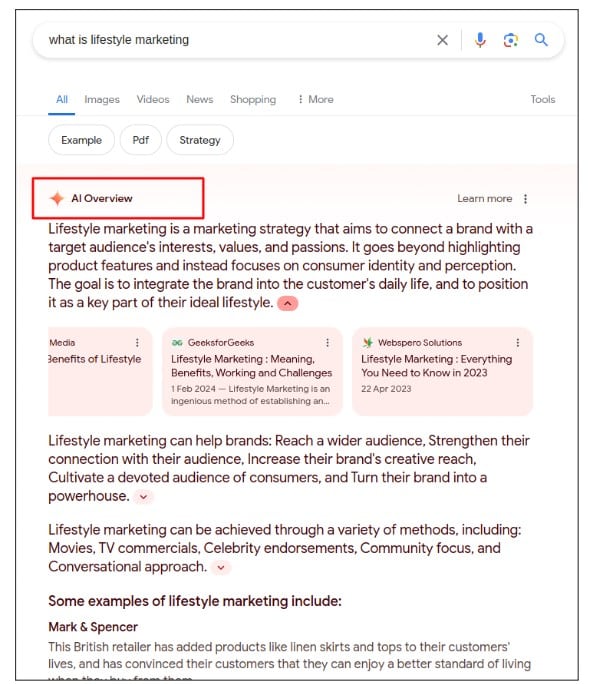
Is There Any Difference Between SGE and AI Overviews
Since its release, many people have been confused as to whether there is any difference between SGE and AI Overviews or not. Well, let us clear up your confusion by telling you that there is technically not much difference between these two terms except their name.
SGE (Search Generative Experience) was the earlier version, launched in May 2023 as an experiment within Google Search Labs. It allowed a limited group of users to test out the AI-generated summaries displayed at the top of search results pages.
On the other hand, AI Overviews is the more polished and finalized version of SGE. Google took the learnings and data gathered during the SGE testing phase to refine the technology. In May 2024, they rolled out AI Overviews as the default search experience for users in the United States, with plans for further global expansion.
How Do AI Overviews Work – Let Google Do The Searching For You
The main idea behind AI Overviews is “Google will do the Googling for you. Just ask.” This approach focuses on efficiency and thoroughness, eliminating the need for users to go through multiple links to gather information.
Instead, when a user poses a question, however complex, Google’s AI Overviews system scans the web for relevant information, pulling from sources such as blogs, business directories, reviews, and more.
It then processes this information, ranks it for relevance and quality, and compiles it into a cohesive response. This response not only answers the query directly but also provides a range of related insights(link cards), helping users understand the topic more deeply if desired. In essence, this is not much different from what we saw when we analyzed SGE. Google AI Overviews leverages real-time data processing and thorough quality assessment to provide users with direct, high-quality answers
Which Links are Mentioned in the Overviews?
Now that you know AI Overviews scour the web for relevant websites and synthesize information into summaries, you might wonder which links get included alongside the answer. According to Google, the platform’s “systems automatically determine which links appear.”
So, even though there are no specific criteria as to which links are shown in the Overviews, here’s what we’ve observed:
AI Overviews casts a wide net, pulling links from a variety of sources beyond website blogs. These include but are not limited to platforms like:
- Government websites
- Quora discussions
- Reddit threads
One noticeable aspect is that AI Overviews not only presents links to textual content but also includes links to YouTube videos, as shown in the picture below.
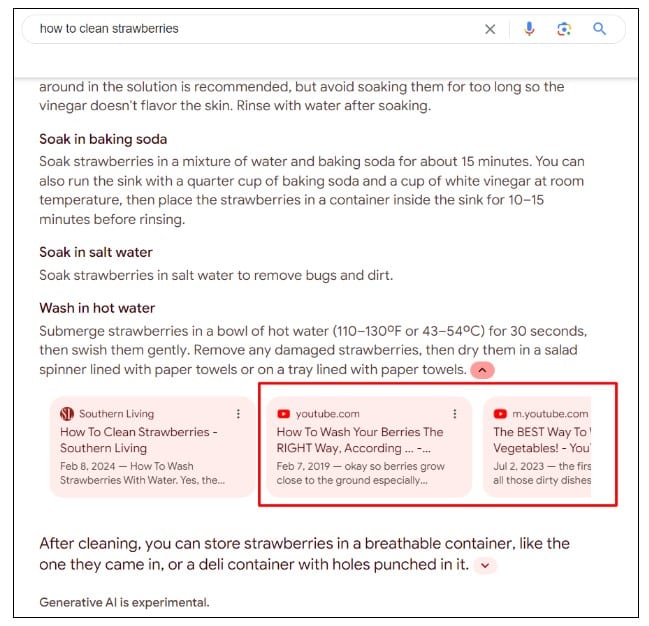
Another interesting observation we made is that the links mentioned in the overviews are not necessarily part of the SERP top 10 rankings. For example, when we searched “how does a ballpoint pen work,” only one of the three links mentioned in the overviews was ranked in the top 10.
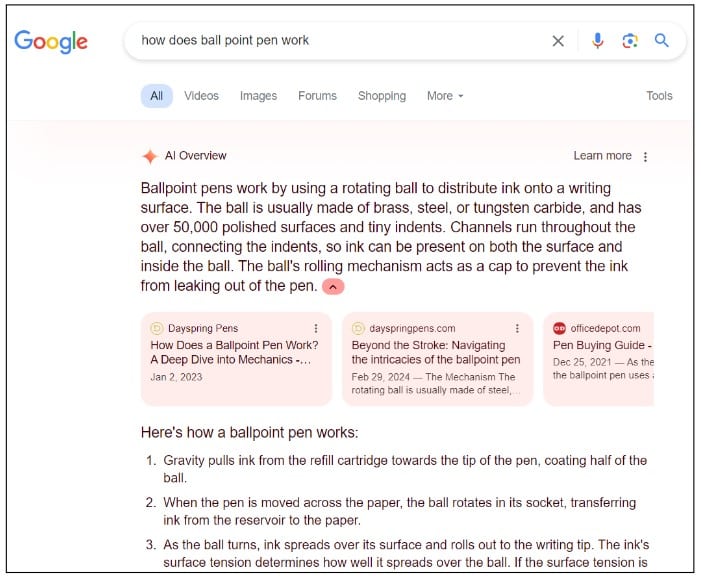
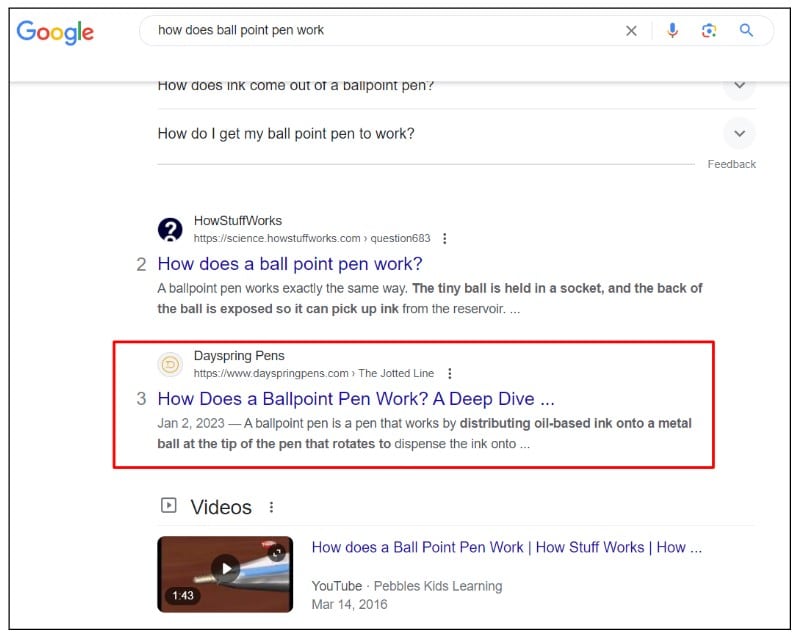
So, these instances clearly show that AI Overviews prioritize relevance over ranking or format. Its aim is to deliver the most valuable information for your query, regardless of where it originates on the web.
How Common Are These Overviews?
AI Overviews won’t appear for every query you ask the search engine. Instead, it aims to answer more complex queries that would otherwise require you to do multiple searches.
For example, a simple query like “Who owns SSC Motors?” doesn’t trigger an overview because it’s straightforward and doesn’t require any additional data processing.

However, when we searched for “what is Google Analytics,” an overview did appear. That is because Google Analytics is multifaceted, and the overview not only provided a definition but also anticipated other related queries users might have, streamlining the search process.
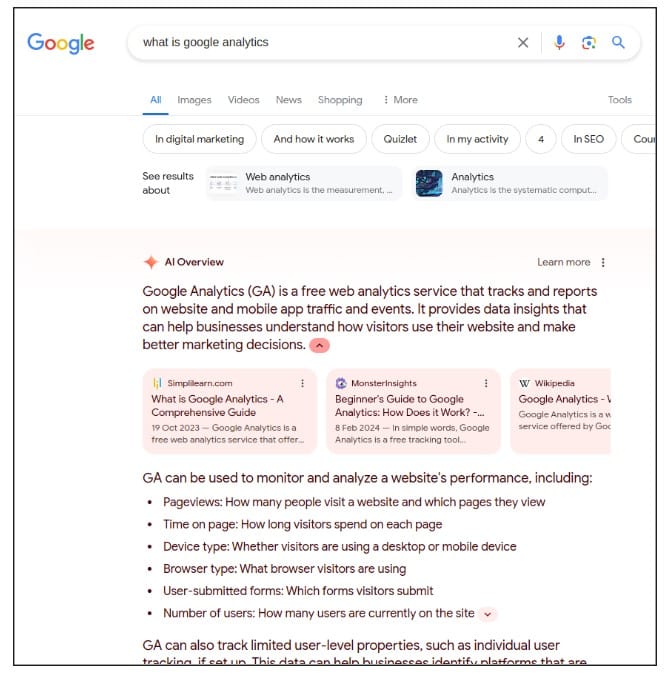
AI Overviews Appearance in Search Results Based on Our Data
Since the launch of AI Overviews, we have been closely monitoring its performance. During the initial testing phase(first two weeks), we analyzed 445 search queries.
Our analysis revealed that AI Overviews appeared for approximately 66% of these queries. Specifically, out of the 445 queries, AI Overviews were present in 293 instances, while they were absent in 152 instances.
This initial data suggested a strong integration of AI Overviews into search results, surpassing our initial expectations. However, recent developments have shown a notable change.
In the past few weeks, particularly following concerns over AI hallucinations, there has been a significant reduction in the appearance of AI Overviews. Google’s response has led to a decrease in the percentage of queries answered by AI Overviews.
Our latest data, derived from an analysis of approximately 520 queries, indicates that AI Overviews now appear for only 16% of queries. This means that for about 82.4% of the queries, AI Overviews are not providing answers.
This insight into the frequency of AI Overviews provides a valuable benchmark as we continue to analyze and understand the broader trends and implications for different industries.
Revealing the Key Features of AI Overviews
At the time of its rollout in the US, AI Overviews provided users with a simple interface that allowed them to get AI-generated responses/ summaries along with a set of link cards for further knowledge.
However, Google doesn’t plan to stop at this. During the I/O conference, Liz Reid gave users a glimpse into what people can expect to see in AI Overviews in the coming months.
-
Multi-step Reasoning
One of the most notable advancements discussed at the I/O ’24 keynote was the introduction of a process named multi-step reasoning.
This innovative feature takes advantage of Google’s Gemini model to handle complex, multi-query searches more efficiently, providing users with comprehensive answers in a single response.
Multi-step reasoning is designed to break down intricate search queries into manageable components, determining the optimal sequence for addressing each part. This capability is particularly useful for “long-tail” searches, which are often more specific and detailed.
At the keynote, Google provided an example to illustrate how this works.
If you search “find the best yoga or pilates studios in Boston and show me details on their intro offers and walking time from Beacon Hill.” Traditionally, you might conduct separate searches for “best yoga studios Boston” and “yoga studios with intro offers near me.” However, AI Overviews would first break this down into three questions:
- Find the best yoga or pilates studios in Boston.
- What are their intro offers?
- What is the walking time from Beacon Hill?
Then, it would find studios with ratings of over 4.1 stars, determine their distance from a specified location, and find information on their introductory offers. Finally, it would display this information along with a map showing the studios and walking directions.
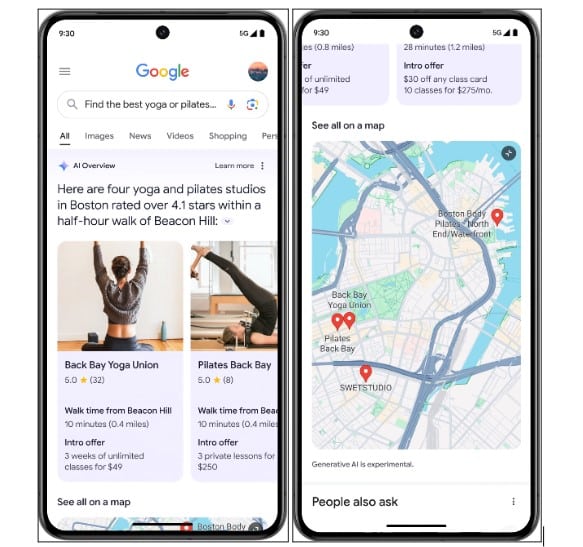
Source: Google
This multi-step reasoning allows AI Overviews to go beyond simply providing a list of links and instead deliver a comprehensive and informative response that directly addresses your needs. It encourages you to ask longer and more specific questions all in one go!
-
Fine-tuning Responses
The next feature in AI Overviews allows users to fine-tune the presentation of information to suit their needs, making complex topics more accessible and detailed inquiries more comprehensive.
Users will be able to choose between ‘Original,’ ‘Simpler,’ and ‘Break it down’ overview styles. The buttons at the top of the search results will control these adjustments.
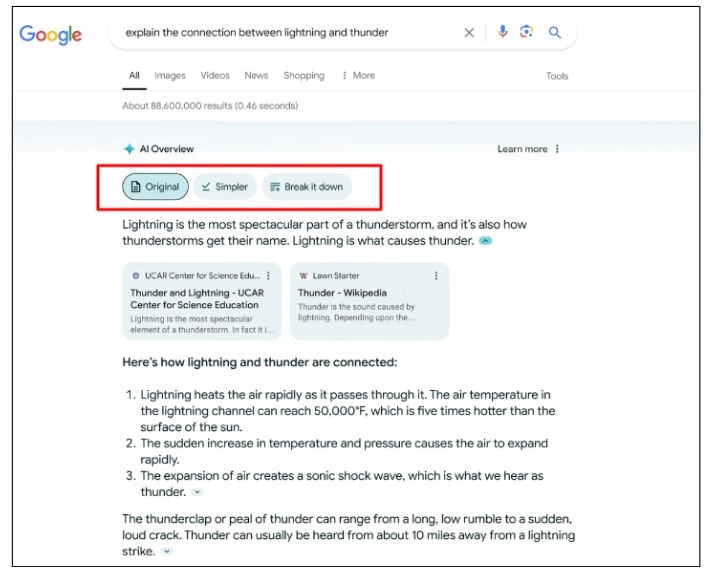
Source: Google
The ‘Simpler’ mode provides concise, easy-to-read summaries that omit technical details, making it perfect for those new to a subject or for explaining complex concepts, especially to children.
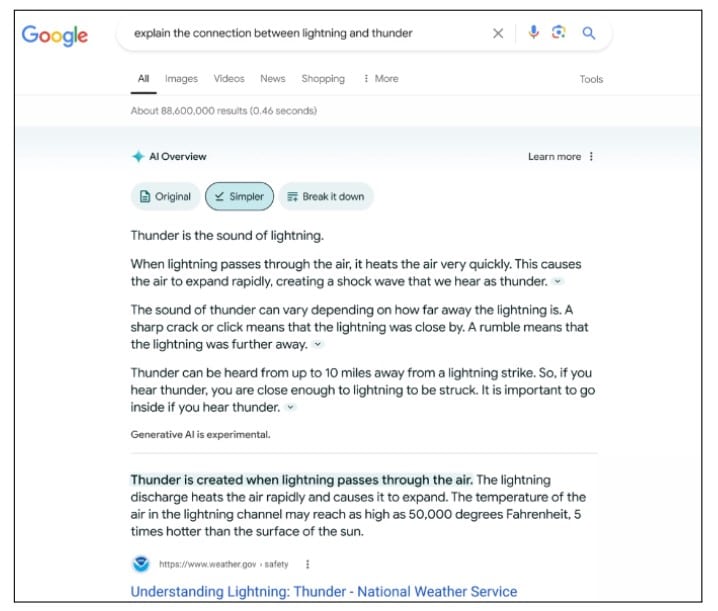
Source: Google
On the other hand, the ‘Break it down’ mode presents all the details in properly ordered and digestible chunks. This style is ideal for those who want a thorough understanding of a topic, as it covers every aspect in a structured format.
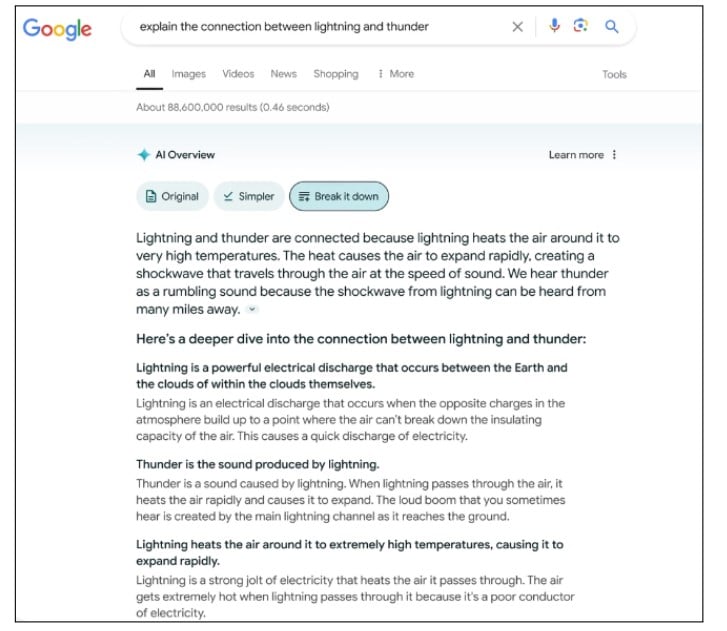
Source: Google
-
Planning Capabilities
Google’s new search capabilities transform how you approach planning, offering detailed, customized assistance for various needs.
For instance, if you search “create a 3-day meal plan for a group that’s easy to prepare,” AI Overviews will analyze your request and provide a curated meal plan featuring a wide range of recipes from across the web.
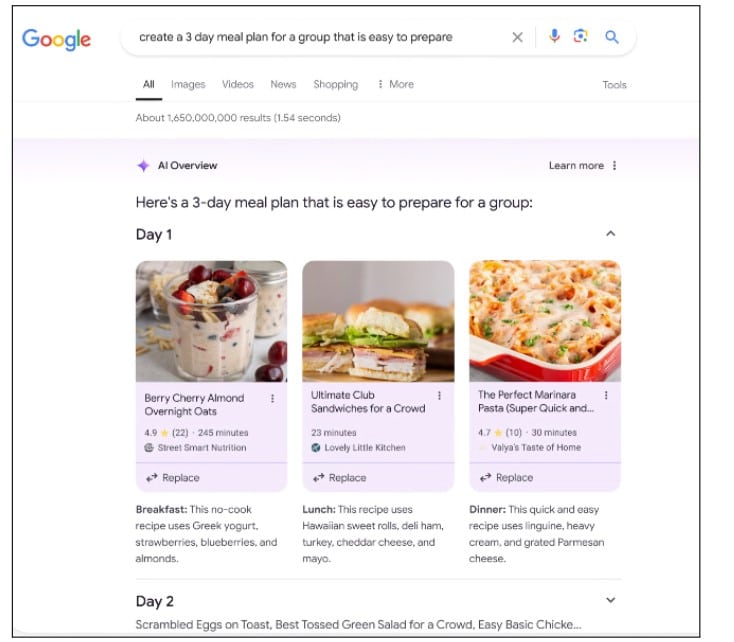
Source: Google
Also, if you want to make any adjustments to the plan, you can easily ask for changes, such as swapping dinner for a vegetarian option, and Search will instantly customize your plan. Once satisfied, you can export your meal plan to Gmail or Docs.
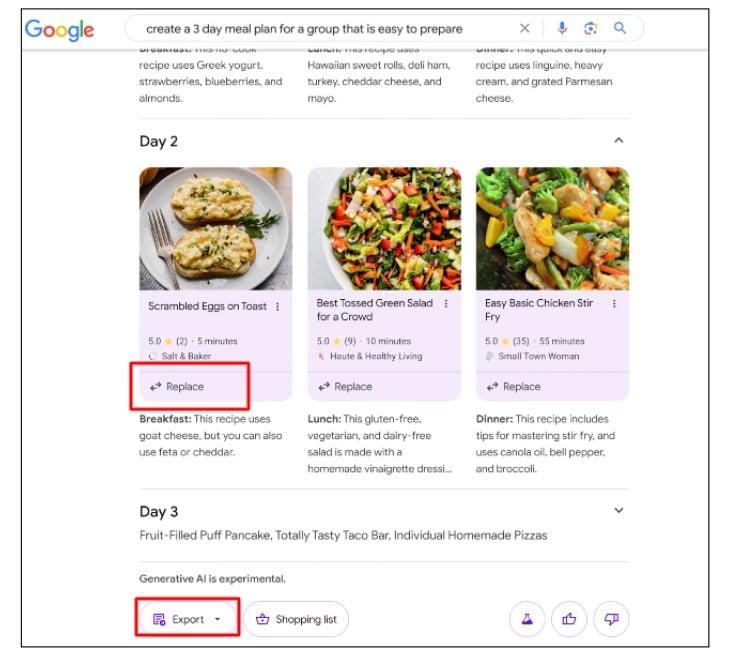
Source: Google
These planning capabilities are currently available in Search Labs in English in the U.S., with more categories like workouts and parties coming soon.
-
AI-Organized Search Results
Struggling to find inspiration? Google Search is about to get a major upgrade with AI-organized results pages. This new feature uses generative AI to categorize search results under unique, AI-generated headlines, making it easier than ever to explore a wide range of ideas.
For instance, if you’re searching for “anniversary celebration dinner places” in your area, the AI will categorize results into sections such as “anniversary-worthy restaurants,” “critic picks for special occasions,” “dishes popular for anniversaries,” and even provide a map highlighting local options.
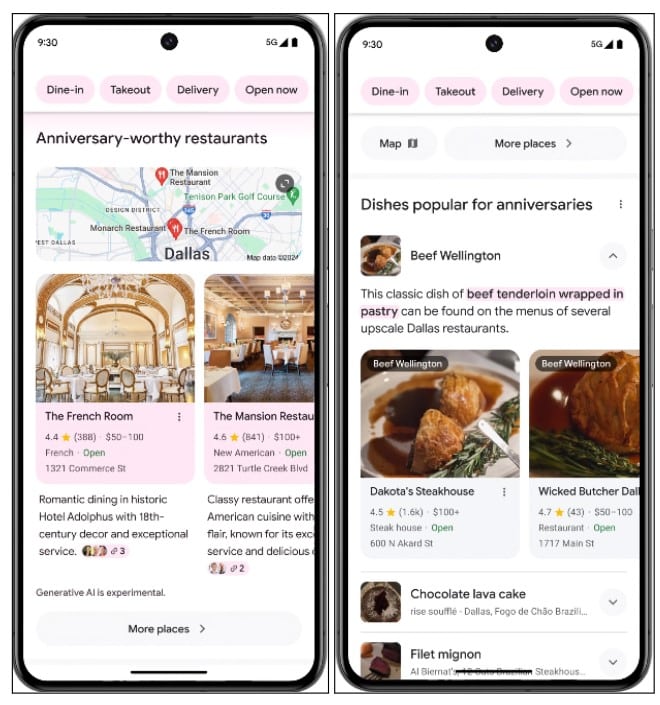
Source: Google
This innovative use of AI in search results will soon extend to areas like movies, music, shopping, hotels, and more. For instance, let’s say you’re looking for the best films in a specific category. Instead of a long, overwhelming list, you’ll see results neatly divided into sub-genres, moods, or eras, allowing you to quickly find the perfect movie for your taste.
-
Search with Video
With Google’s ongoing efforts to enhance multimodal AI, the next frontier is video search, offering a revolutionary way to interact with information.
Powered by the Multitask Unified Model (MUM) introduced in 2021, Google Lens can now process videos, allowing users to simultaneously seek answers through visual and auditory inputs.
This feature was highlighted during Google’s I/O 2024 event, where a live demo showcased the practical application of video search. In the demo, a video of a record player with a faulty tonearm was captured using Google Lens.
When the presenter inquired, “Why will this not stay in place?” AI Overviews provided a comprehensive response, as seen in the screenshot below:
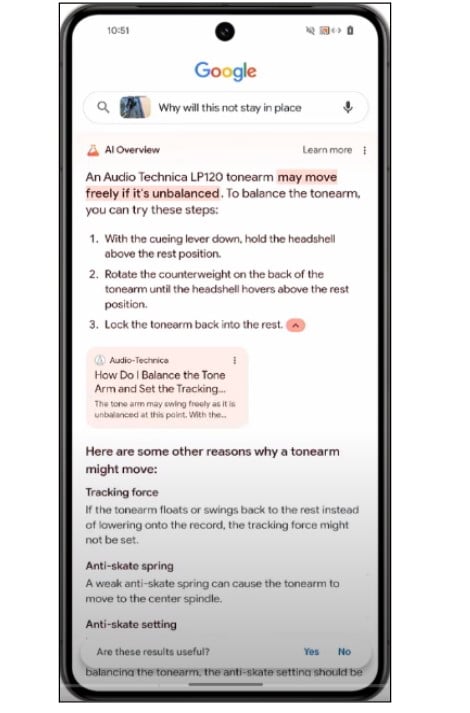
Source: Google (via Youtube)
The response given by AI Overviews is pretty impressive as it:
- Identified the problematic component as the tonearm.
- Recognized the brand and model of the record player.
- Suggested that the issue might be due to the tonearm being unbalanced.
- Offered a step-by-step guide to resolve the issue.
- Linked to a how-to guide for further details.
- Listed additional reasons for the malfunction.
Are AI Overviews Accurate?
Just like any new technology, AI Overviews is also not perfect!
Since its official launch, many people have asked it all sorts of questions, and well, let’s say that even though it gets much information correct, it’s also highly prone to AI hallucinations.
Many users also shared their experience of receiving bizarre and inaccurate answers with this new technology on X (formerly Twitter). Let’s take a look at some of them:
https://t.co/W09ssjvOkJ pic.twitter.com/6ALCbz6EjK
— SG-r01 (@heavenrend) May 22, 2024
Google’s AI overview recommends eating rocks 🤣
This is not satire, try googling it.
Source seems to be an @TheOnion article. pic.twitter.com/jZtJGNiFvc— Heshie Brody (@heshiebee) May 24, 2024
Google, FFS. pic.twitter.com/UHtLQ5SdpG
— Melanie Mitchell (@MelMitchell1) May 23, 2024
Why Is It Getting Things Wrong?
The main reason AIO gets things wrong is that it gets its answers and data from the search engine itself. For example, in the case of AIO recommending glue on pizza, it took it from a joke post on Reddit.
This error likely stemmed from the AI identifying the joke post as relevant to a user’s query about cheese not sticking to pizza. However, a mistake occurred during the information retrieval process, leading to bizarre and incorrect recommendations.
However, it’s not only about the data it’s trained upon, as it can generate incorrect information from sources that are factually correct as well. For example, when asked, “How many Muslim presidents has the US had?” AI Overviews replied, “The United States has had one Muslim president, Barack Hussein Obama.”
Now, although Barack Obama is not Muslim, which makes the AI systems’ answer incorrect, the information it cited came from a chapter in a book titled Barack Hussein Obama: America’s First Muslim President?
This instance shows that the AI model not only overlooked the main point of the essay but also misinterpreted it in a manner that was completely contrary to its intended meaning.
Addressing the Concerns
Talking about these AI hallucinations, Liz Reid, in a recent blog post, said, “Some odd, inaccurate or unhelpful AI Overviews certainly did show up. And while these were generally for queries that people don’t commonly do, it highlighted some specific areas that we needed to improve.”
She also wrote, “In a small number of cases, we have seen AI Overviews misinterpret language on webpages and present inaccurate information. We worked quickly to address these issues, either through improvements to our algorithms or through established processes to remove responses that don’t comply with our policies.”
She further mentioned that the company has made a lot of improvements since the advent of these hallucinations and has also scaled back on many AI answers.
Ultimately, there’s no doubt that AI is not the most reliable source out there, and inaccuracies are always going to be a risk.
The Impact of AI Overviews on SEO
Now, let’s come on to the burning question that is on top of every marketer’s mind – how will AI overviews impact their ranking and organic search performance?
Will Organic Traffic Go Down?
The introduction of AI Overviews in Google Search has raised a pressing question: Will organic traffic decrease? Well, maybe! These AI-generated summaries offer users comprehensive answers directly on the search results page, diminishing the need for users to visit individual websites. This change could lead to a decline in organic traffic for sites that provide straightforward answers to informational queries.
However, the impact may not be fully negative. In an interview with Search Engine Land, Hema Budaraju (Senior Director of Product, Search Generative Experience, Google) shared that CTRs on links provided by AI Overviews are higher than traditional web results.
This means that sites that can capture these link cards may have additional clicks. On the other hand, with so much focus and attention placed at the top of the search results, it remains to be seen what share of clicks the traditional listings lower down will receive.
Challenges in Monitoring Traffic
Another thing Budaraju said that is worth noticing is that clicks from AI Overviews won’t be differentiated in Google Search Console. While AI Overview link cards may achieve higher CTRs than other organic listings, it is not currently possible to monitor this traffic specifically.
GSC records clicks and impressions for AI Overviews in the same way it does for standard organic listings, but it lacks filtering options to separate Overview traffic. This creates challenges for reporting and optimization, as there is no quantitative method to specifically assess the performance of AI Overviews at this time.
Can You Optimize for AI Overviews?
According to Google, “There is nothing special for creators to do to be considered other than to follow our regular guidance for appearing in search, as covered in Google Search Essentials.”
So, while there are no special guidelines for appearing in AI Overviews, there are a few ways we found that can increase one’s chances of featuring in them. Let’s take a look at some of the best practices.
-
Target Long Tail Keywords
To increase the likelihood of being featured in AI Overviews, targeting long-tail keywords is essential. Long-tail keywords are specific search queries that are typically longer and more detailed.
As AI Overviews handle complex queries effectively, content optimized around these specific keywords can stand out. These keywords often indicate a user’s specific needs or questions, making it easier for AI algorithms to find and feature relevant content.
-
Create Quality Content (E-E-A-T)
Creating high-quality content is fundamental for appearing in AI Overviews. Google’s algorithms prioritize content that meets the E-E-A-T standards—Experience, Expertise, Authoritativeness, and Trustworthiness. To meet these standards, make sure your content is:
- Accurate: Ensure factual correctness and reliable information.
- Original: Offer unique insights or present information in a fresh way.
- Expert: Written by professionals with a deep understanding of the topic.
- Valuable: Address user needs and answer their questions directly.
To achieve this, consider collaborating with subject matter experts and implementing a thorough editing and review process. This is especially crucial for “Your Money or Your Life” (YMYL) topics like finance, health, and legal matters, where inaccurate information can have serious consequences.
-
Utilize Generative Engine Optimization (GEO)
Generative Engine Optimization (GEO) is an advanced approach to SEO tailored for AI-driven search engines. GEO involves optimizing content to be more compatible with AI’s ability to generate integrated responses.
This includes creating detailed, authoritative content that can be easily synthesized by AI. By aligning your SEO strategies with GEO, you can improve the chances of your content being featured in AI models like AI Overviews and Microsoft Copilot in Bing, as it signals to the AI that your content is reliable and valuable.
-
Improve User Experience
A positive user experience is still important for search ranking and likely for AI Overviews as well. Here’s how to optimize UX:
- Speed: Ensure your content loads quickly, ideally within seconds.
- Mobile-friendliness: Make sure your content displays well on mobile devices without zooming or horizontal scrolling. Use responsive design for a seamless viewing experience across devices.
- Secure Content: Use HTTPS to encrypt user data and ensure a secure browsing experience.
-
Leverage Conversational Language and Multimedia
Optimizing your content for natural language and conversational queries is increasingly important as voice search and AI Overviews become more prevalent. This involves using language that mimics how people speak and ask questions.
Incorporating multimedia elements such as images, videos, and infographics can also make your content more engaging and easier for AI to understand and present. By focusing on natural language and multimedia, you can create content that is not only informative but also appealing to both users and AI algorithms.
How to Turn Off AI Overviews
Now, we understand that these Overviews can sometimes be frustrating, especially when searching for information on topics like health and finance. Also, considering that they sometimes provide false information, you might not want them in your search engine.
Below, you can see how much people want to opt out of this feature showing up on the search results page:
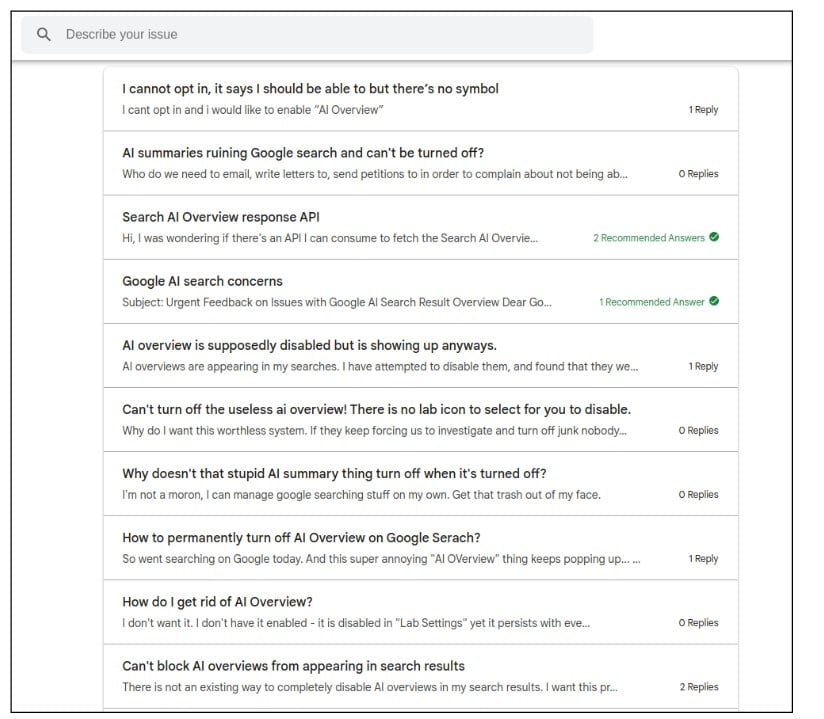
Now, the question is – is there a way to turn off AI Overviews?
Well, the answer is not as simple as one might think. While you cannot turn off AI Overviews from your search results entirely, there are ways around it.
1. Choose the “Web” Option
The first and most straightforward workaround to disable AI Overviews is to use the Web tab at the top of the search results page. Here’s how:
- On the Google web browser (Android/ iPhone) or when using the Google mobile app, tap the Web tab at the top of the results page. If you don’t see it, swipe left on the tabs below the search bar until it appears.
- On a computer, click the More tab above the search results, then click Web.
This allows you to quickly switch to a traditional search view with only links, bypassing the AI summary at the top.
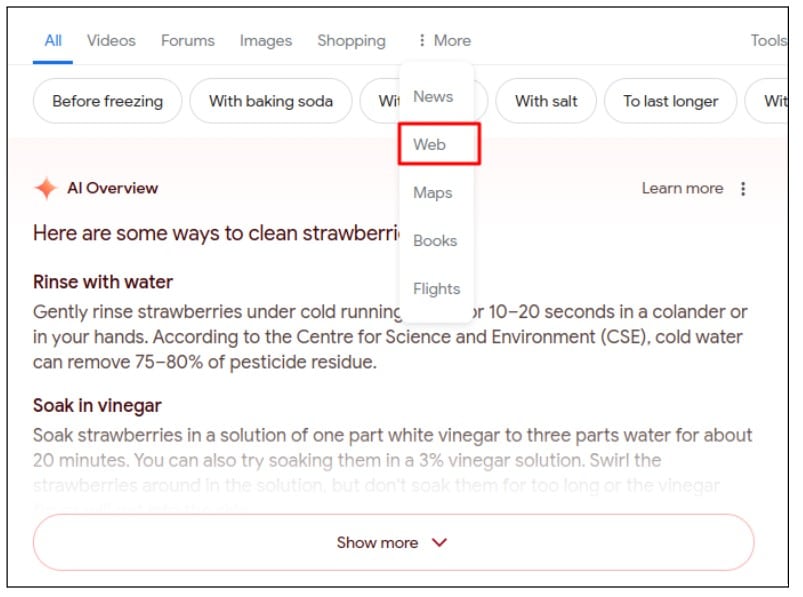
2. Use the Hide Google AI Overviews extension for Chrome
The second workaround involves using the Hide Google AI Overviews extension for Chrome.
This extension is specifically designed for Chrome users who want to avoid AI-generated summaries in their Google search results. You can install it from the Chrome Web Store by clicking “Add to Chrome” and then “Add extension.”
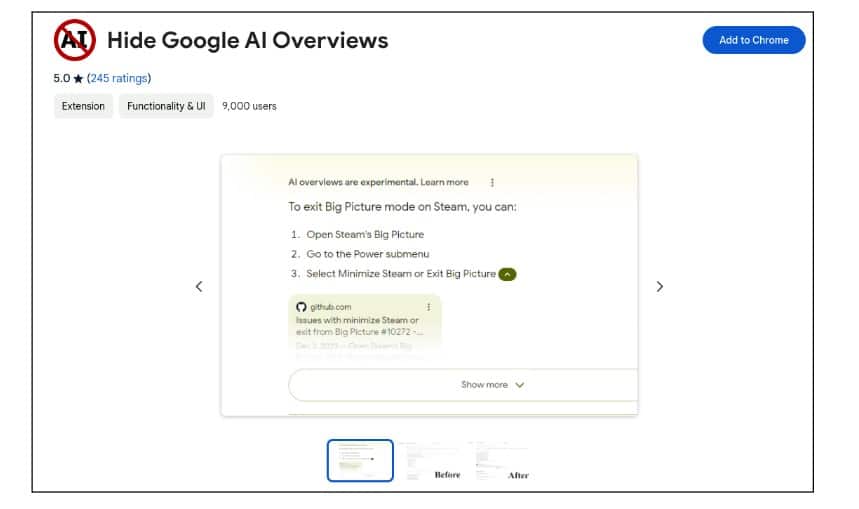
| You can also find guidance on how to accomplish this task across various platforms like Chrome on Android, iOS, Mac, and Windows, as well as Firefox on Mac and Windows on the website tenbluelinks. |
3. Modify Browser Settings
One way mentioned on the site to prevent AI Overviews from appearing in your Google search results is by adjusting your browser settings. If you’re using Chrome on Windows or Mac, just follow these steps:
- Head to Settings > Search engine > Manage search engines and site search.
- Click on the “Add” button next to “Site Search update.” A new box will appear.
Fill in the form with the following details: - Name: Google Web
- Shortcut: @web
- URL: {google:baseURL}search?q=%s&udm=14
- Once you’ve filled out the form, you’ll see “Google Web” added to the list of search engines.
- Click on the three stacked dots located on the right side of this new option. Then, select “Make Default.”
From now on, whenever you use the search box to conduct a Google search, you won’t encounter any Google AI overview results.
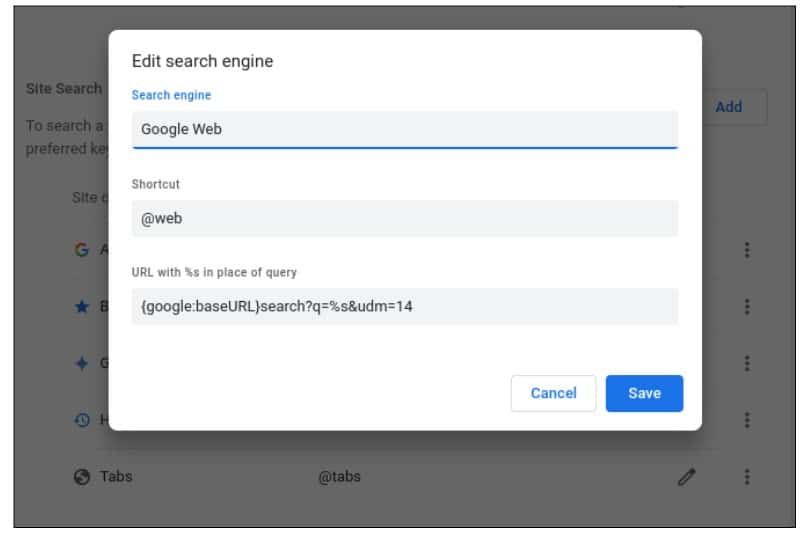
Final Thoughts
While AI Overviews is completely changing the way we search and bringing in a revolution, it’s important to note that amidst all this, SEO is far from dead!
Google is once again reshaping the face of search, just as it has done with the introduction of featured snippets, “People also ask” sections, local search results, and more. These evolutions have always pushed us to adapt our strategies, and AI Overviews is simply the next chapter in this ongoing transformation.
So, if you want to navigate these changes and ensure your brand stands out in this highly competitive interface, get in touch with WebSpero Solutions. We can help you enhance your website ranking through expert strategies tailored to the latest trends and technologies in search.
